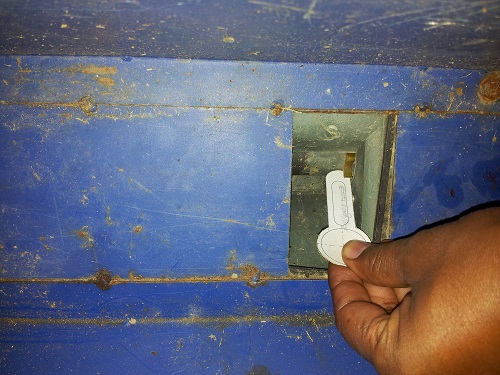DHAKA, Bangladesh (CIMMYT) – The Cereal Systems Initiative for South Asia (CSISA) is helping farmers in Bangladesh save money and time with the implementation of simple calibration keys.

CSISA’s Mechanization and Irrigation project (CSISA-MI) has introduced keys to replace the tedious task of calibrating seeding rate of power tiller operated seeders (PTOS). This new, easy-to-use tool, allows farmers to save time and money with the fast and accurate adjustment of the seed distribution rate without additional resources (e.g. two-wheel tractor, land space, seeds, weighing scale, mathematical calculations, calculator etc.).
Previously, local machinery service providers (LSPs) needed to go through a time-consuming and resource-demanding calibration process so that the correct number of seeds per hectare are distributed. Potential LSPs who received training on calibration had difficulty remembering how to do the procedure due to its complexity, reducing their willingness to provide their services. Initial calibration is usually conducted on a road or farmers’ yard, rarely would an LSP or farmer confirm the calibrated seed rate under actual field operating conditions as is recommended.

Using the key, crop specific seed meter calibration can be completed in the field in under ten minutes and LPSs can quickly re-adjust the machine to sow multiple crops in a single day.
Currently, the calibration keys are only for the common crops in Bangladesh – wheat, mung bean, lentil, sesame, and jute. However, more keys can be added for other crops or different sizes of seed meter.
The keys are commercially produced by a local service provider, Alam Engineering Works, using metal cutting dies for precision with technical support from the project. A set of high-quality stainless steel keys costs about $2.
CSISA-MI is led by the International Maize and Wheat Improvement Center (CIMMYT) and is a United States Agency for International Development (USAID) funded project that has been running successfully in the Feed the Future (FtF) zone in Bangladesh in partnership with International Development Enterprises (iDE). CSISA-MI has developed local service providers (LSPs), transformed the agricultural mechanization value chain and scaled-out key agricultural machinery services in the FtF zone to the individual farmers at low cost for higher yields, through agronomic and technical training. It has introduced Axial Flow Pump (AFP) for water conveyance, power tiller operated seeders for mechanized land preparation and seeding and Reapers for mechanized harvesting.
 Capacity development
Capacity development 
